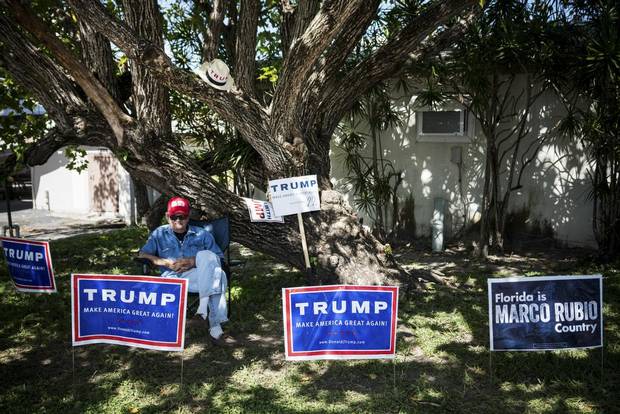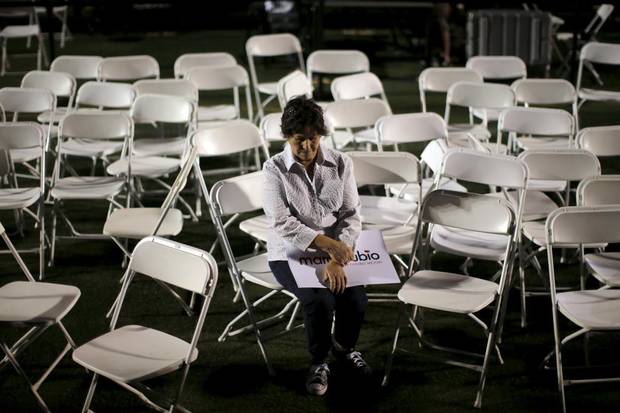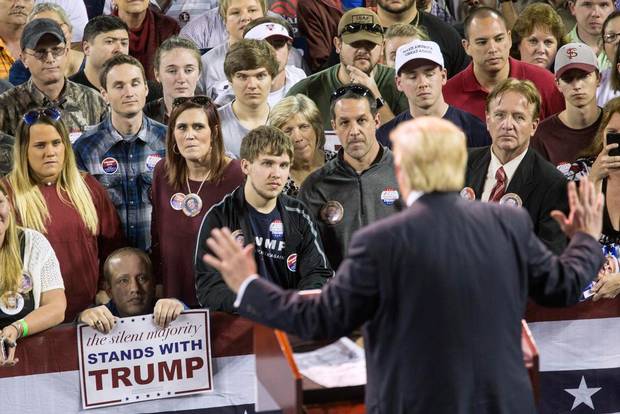Clay lion heads stare down from the walls. Tony Fratto sips unsweetened green tea from a bottle. A warm breeze blows across the patio.
To all appearances, it's an ordinary spring day in the U.S. capital. Mr. Fratto's office is blocks away from the White House, where he used to serve as deputy press secretary to George W. Bush. Now, he's a communications consultant, and looks it, in his purple checked shirt and chunky designer glasses.
But the air of normality dissipates when he begins to speak. Soon, Mr. Fratto is talking about a "false prophet" and a "vile human being" and a "voice in the desert."
The Republican establishment is anxious. That anxiety has broken out across the country, but is most acute in Washington and Miami. Party eminences talk of confusion, despair and especially fear; the five stages of grief are often compressed into 30 minutes of conversation. They talk about the party hurtling beyond their control.
What they're talking about, of course, is Donald Trump. In six short months, the billionaire developer has shattered a Republican coalition that has survived for half a century and exposed the yawning gap between the priorities of the party and the people it claims to lead.
His rise has also revealed a canon of grievances, both economic and cultural, that the party seems incapable of addressing – or unwilling to.
Now, as Trump marches toward the nomination with his legions of angry voters, members of the Republican establishment are biting their nails, resorting to gallows humour and praying. Where just weeks ago they felt blindsided, a note of resignation, even defeat, has started to take hold. For many, the goal is no longer to save the party. It is to get the party back one day.
"When there's a forest fire," Mr. Fratto said, "sometimes the thing is just to let it burn out."
What, or who, is the Establishment?

Jose Prado leans on a Donald Trump sign in Miami this week. To keep the ‘Silent Majority’ in the fold, the Republican party has had to face outside challenges from time to time, but nothing like Mr. Trump.
TODD HEISLER/New York Times
The "Republican Establishment" has become the great cliché of this election cycle. Self-styled outsider candidates such as Ted Cruz and Mr. Trump use the phrase with abandon; pundits are even worse. It can seem to mean both everything and nothing – those who deploy it have rightly intuited that the expression gains its power to fascinate and disturb precisely from the vagueness of its meaning.
But for all the hype and exaggeration that surrounds it, the party's establishment is real. Its power and cohesion may be diminished, but a loose nexus of people with a stake in the fortunes of the Republican Party still try to shape its agenda and strategies.
They are donors, ex-presidential aides, lobbyists, political consultants, think tankers, members of Congress, and even powerful media figures. More than any professional status, these people are united in a rough worldview, one that features a strong preference for "dignified," even "statesmanlike" behaviour from elected officials; a hostility to big government but a respect for the business of governing; a proud embrace of America's leading role on the world stage; and an unbending adherence to free-market economics.
Where once these values were cherished, members of the party establishment now have a decidedly ambiguous, not to say tortured, relationship to their status. Especially in this strange political moment, they are like people afraid of their own shadow.
Still others – especially those at its very centre – question the very existence of an "establishment." " 'Establishment' suggests there must be some Wizard of Oz somewhere, pulling the strings," former U.S. Republican presidential candidate Mitt Romney said on Fox News last Sunday. "That's not how things work."
Meanwhile, the people who take the Establishment most seriously tend to feel abused by it, and theirs is a vengeful mood.
"There is an Establishment," said Tom Kilgannon, an activist with the right-wing Freedom Alliance, sitting alone in the ballroom of the Conservative Political Action Conference last Saturday. "A club, if you will. People who make the rules."
That club, he believes, has betrayed the voters who gave it power by neglecting the issues they care about most: changing norms ("and not for the better") around family and sexuality; immigration from Mexico; and the economic hardship caused by globalization. "Americans have been increasingly concerned over the past 25 years … and they've been ignored, they've been called names, they've been mocked," he said. "They're being told, 'That's how the market works – deal with it.' There's been very little compassion."
The people Mr. Kilgannon was describing have been loyal Republicans since the 1968 election, when Richard Nixon promised to restore law and order to a country marred by crime and rioting, invoking a "Silent Majority" of conventional, conservative Americans.
Since then, the party leadership has maintained a tenuous alliance with these voters, clustered in the industrial northeast and suburban southwest. Parochial, socially conservative, and economically middle-of-the-road, they were in some ways an awkward fit within the party of big business and foreign interventionism. to keep the Silent Majority in the fold, establishment Republican candidates have supported gun rights and stood against abortion, made the right noises about illegal immigration and embraced crime-fighting policies that disproportionately lock up young black men.
At the same time, the party has pursued a parallel agenda with little relevance to their new voters, but also where it didn't directly cause them harm: slashing regulations on business, cutting taxes for the rich and an aggressive foreign policy.
"Social conservatives have been important for a long time. … Every president has at least had to pay lip service to these conservatives," said Julian Zelizer, a political historian at Princeton University. "But the reality is, when Republicans actually get to the White House and sit down and choose their priorities, it's pretty clear that it's about deregulation [and] low taxes."
This bargain has faced challenges from outsider candidates before – Patrick Buchanan called his nativist movement in the 1996 primaries "peasants" with "pitchforks" – but this time the scale and staying power of the rebellion are different.
There are two main reasons, neither of them flattering to Republicans. The first is that things really have gotten worse for the white working class, especially in the past decade. A study published last November by two Princeton economists – coinciding uncannily with the rise of Mr. Trump – showed that the mortality rate for poorly educated middle-aged white people had actually increased since the end of the previous millennium, while death rates for every other racial group in the country declined. The cause, the study found, was an epidemic of alcoholism, prescription drug abuse and suicide.
While the mainstream Republican Party continues to offer an economic program of free trade, social-security reforms, budget austerity and tax cuts for the rich, Mr. Trump has taken the opposite tack. He calls for leaving social security "as is," erecting new trade tariffs and building a wall on the Mexican border to keep immigrants from undercutting wages. It's a message that has resonated with workers feeling bruised by the harsh logic of markets and the social dislocation of a more open world. At the "heart" of the Trump phenomenon, said the Texas-based Republican consultant Matt Mackowiak, "is that the party is pro big business, and the base is not … I think there's a natural tension that's there."
The second reason is the Republican Establishment's deep complicity in churning up the uglier energies Mr. Trump is harnessing. According to consultants from both parties, the party has shifted during the Obama presidency from patronizing and accommodating the angry bigots in its midst to welcoming them into the GOP mainstream. Mr. Romney's acceptance of Donald Trump's endorsement in 2012, when the businessman was leading the "birther" movement demanding to see Barack Obama's birth certificate, is presented as a seminal moment in this shift.
The metaphors for this relationship are various and vivid. The neoconservative intellectual, Robert Kagan, has called Mr. Trump the party's Frankenstein's monster; liberal satirist Bill Maher compared the party to Faust. Norman Ornstein, a centrist scholar with the American Enterprise Institute, says the Republican leadership has been acting like a homeowner who keeps Rottweilers in his front yard to intimidate the neighbours, only to find that the dogs don't recognize him as their owner.
The bookshelves of Mr. Ornstein's Washington office are lined with photos of him posing with Republican leaders from Gerald Ford to Dick Cheney. But he has fled any connection to the GOP over the "crazies" it harbours. The party's current malaise, Mr. Ornstein said, is a "self-inflicted wound."
Substance or marketing?

Trump supporters wait for the arrival of their candidate at a campaign rally March 7 in Concord, North Carolina.
Sean Rayford/Getty Images
IIt wasn't supposed to be this way. The Republicans had a plan – or thought they did.
A month after Mr. Romney went down to defeat in the 2012 general election, the Republican National Committee commissioned a report on the future of the party. The resulting document was titled the "Growth and Opportunity Project."
The paper's table of contents points to the basic spirit of the exercise: There are chapters on "Messaging," "Demographic Partners," "Campaign Mechanics," "Campaign Finance," and "Fundraising," but none on issues.The idea running through the report is that, for Republicans to win national elections, they must follow a simple plan: same policies, gentler message.
That this strategy has been entirely repudiated, and that the Republican frontrunner instead has proposed a raft of new policies with a harsher message, has left many establishment Republicans stunned.
"In many rooms around Washington, D.C., you have many people with headaches and wrinkled brows, saying, 'How could this happen?' " said Douglas Holtz-Eakin, who served in both Bush White Houses and led the hyperwonkish Congressional Budget Office from 2003 to 2005.
Mr. Holtz-Eakin is part of a sizable school of thought that continues to believe that the party's problem is mainly one of marketing, and that Mr. Trump represents an anomaly, conjured up through force of personality and ratings-hungry cable-news channels. He thinks the party's candidates have done a poor job selling the fairly abstract notion that free markets and free trade make everyone richer in the long run, short-term pain notwithstanding. "If you want to be successful you have to make that sale," he said. "It's a complicated sale."
Mr. Fratto, now a partner at the communications consultant Hamilton Place Strategies, agreed that the key to rebuilding the Republican Party was through educating voters about their economic interests, but said the moment to do so had passed.
Sitting on the patio of his D.C. office, he spoke with the kind of freedom that comes from having settled cozily into a sense of despair.
"The time of an election with a loudmouth demagogue is not the time to be teaching on Ricardian trade theory," he said. "You have to find ways to do it in good times. People don't want to hear theories when the house is on fire."
Hope rests on Rubio

A Marco Rubio supporter sits after a campaign rally in Miami March 9. Pundits believe Mr. Rubio‘s chances in the campaign hinge on winning his home state of Florida on March 15.
CARLOS BARRIA/REUTERS
If the Establishment has still has a chance of salvation in this election, it will come in the form of Marco Rubio. The junior senator from Florida would seem to have been crafted in an RNC lab. He's Latino; he's handsome; he's youthful (a boyish 44); and he projects respectability while skillfully pressing the Bible-and-Constitution buttons of the conservative base.
He has just one major liability: an inability to win primaries. So far, Mr. Rubio has won just one state, deeply liberal Minnesota, and finds himself in a probably insurmountable hole.
His last chance of recovery is in his home state of Florida. The winner-take-all primary on Tuesday, which will award 99 delegates to the top vote-getter, has the potential to be a kind of Juno Beach for the Republican Establishment – or a Waterloo.
If Mr. Rubio wins, it will dramatically increase the odds that the party's nominee is chosen at the Republican convention in Cleveland this summer – that is to say, that it will be anybody but Mr. Trump.
The party seems to understand the stakes – Super PACs had spent millions on ads backing Mr. Rubio in the state ahead of the important Republican debate on Thursday.
"It does seem like there's been some wallets opening in places like Florida to try and stop Trump," said Kyle Kondik, a political analyst at the University of Virginia.
But Florida's favourite son faces long odds. He trails Mr. Trump by more than 10 points in most polls, despite having held office at various levels in the state for more than a decade.
In a disquieting sign of the Rubio camp, star Republican fundraiser Remedios Diaz Oliver, chief executive officer of All American Containers, now speaks as though the larger battle for the soul of the party had already been lost.
"Maybe things will be resolved. It's not the end of the world. We can work to build it again," she said on Wednesday. "I wake up in the morning and I pray."
The Republican mayor of Miami, Tomas Regalado, struck a less fatalistic note, expressing horror at the Trump phenomenon and singing the praises of Mr. Rubio, whom he has supported since the beginning of the race.
But Even Tomas Regalado was far from optimistic about the prospects of stopping the New York businessman. Sitting folded in on himself at a large conference table, gazing at the bay and the palm trees outside his window, the Republican mayor of Miami spoke of Mr. Rubio's candidacy in the past tense. "Marco was supposed to be the person who could save the Republican Party," he said. "He was the perfect fit! So what happened on the road to that goal? I guess Trump got in the middle."
On Wednesday, Mr. Rubio held a rally in the heavily Cuban suburb of Hialeah, a gritty, lower-middle-class enclave full of tire shops and restaurant equipment depots.
His campaign chose a local football field as the backdrop and packed it full of Hollywood flourishes: To commemorate the death of Nancy Reagan, an American flag stood at half-mast; the stucco cross of a nearby church loomed overhead; sunlight poured through a picturesque arrangement of cumulus clouds; and a football scoreboard showed a tie game, 45-45, with no downs and no time left.
"As it usually does, it comes down to Florida," Mr. Rubio said. His wife, Jeanette, a former Miami Dolphins cheerleader, stood by his side. About half of the local politicians in Miami-Dade County were arrayed behind the stage in a tableau of Latino professional success. Mr. Rubio delivered applause lines in Spanish and English with equal fluency and force to a crowd of elderly Cubans in church clothes and clean-cut, young Republicans.
But in his boyish optimism and slick presentation, Mr. Rubio seemed out of step with the times. "Ours has never been an anxious or a fearful people," he said. Surely, that is no longer true.
Nor could it be said for Mr. Rubio's supporters. Asked about his chances, Rebeca Sosa, a Miami-Dade commissioner, was equivocal. "I am a woman of faith," she said. "We're going to do everything in our power to make it happen. But if it doesn't happen, he's a young person and maybe God has something planned for him."
Coping with a Trump victory
At the Republican debate at the University of Miami on Thursday, Mr. Trump had an air of confidence about him. He seemed to be pivoting toward the general election, offering a more subdued tone and speaking of his broad appeal.
"Frankly, the Republican Establishment, or whatever you want to call it, should embrace what is happening," he said.
There are signs that that is beginning to happen. Before the debate, RNC Chairman Reince Priebus took the extraordinary step of taking the stage to insist that the party would rally behind its eventual nominee, whoever that was.
"Here we are, again, together," he intoned.
The fight seems even to have drained out of Mr. Rubio. He gave a fluent performance in the debate, providing eloquent expression to the mainline Republican positions on Israel, social security, skilled immigration, free trade, energy policy and Cuba.
But if the performance was fluent, it also seemed perfunctory. He largely avoided attacking or even addressing Mr. Trump, and did so only with a kind of weary formalism.
Even in the Spin Room afterwards, where surrogates for the candidates put a sunny gloss on their boss's showing, the Rubio flak Alex Conant appeared deflated. Asked about a growing number of Establishment figures throwing their weight behind Ted Cruz, Mr. Conant replied, "We have our own share of endorsements. But I think voters are making up their own minds in this election."
In Washington, others are already turning their minds to coping with a Trump victory. Beltway Republicans are plotting revenge, Mr. Holtz-Eakin says. The vast apparatus of favour-trading, advice-giving and back-scratching that constitutes the GOP power machine in Washington may simply grind to a halt under a Trump presidency, he says, as a kind of rear-guard action.
"It takes 1,000 people to get anything done in D.C. and a lot of them are licking their wounds," Mr. Holtz-Eakin said.
Of course, he hopes it doesn't come to that kind of intraparty guerilla warfare. He still has faith that the Establishment can regain control of the party one day. He just doesn't know how, or when.
"I'm not sure this is a genie that can't be put back in the bottle," he said. "It's a very big genie that's ravaging the countryside, and we still don't know what to feed it."
